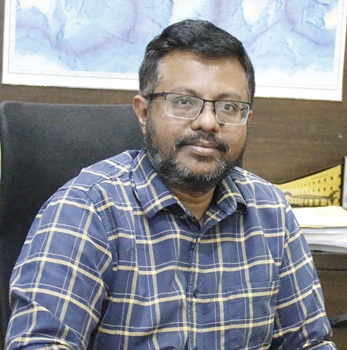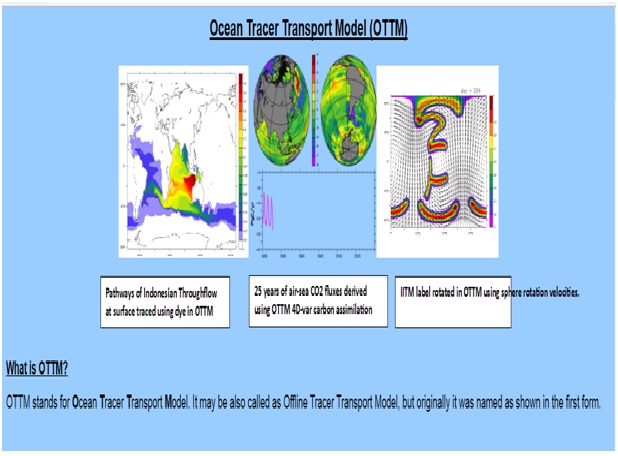Scientist Profile

Dr. Vinu K. Valsala
Designation
: Scientist G
Phone
: +91-(0)20-25904509
Fax
: +91-(0)20-25865142
Email ID
: valsala[at]tropmet[dot]res[dot]in
| Degree | University | Year | Stream |
|---|---|---|---|
| Ph.D | Hokkaido University, Japan | 2006 | Oceanic and Atmospheric Sciences |
| M. Sc. | Cochin University of Science and Technology | 2002 | Physical Oceanography |
| B.Sc. | University of Kerala | 1999 | Physics, Chemistry, Mathematics |
 pCO2, biogeochemical modelling and data assimilation
pCO2, biogeochemical modelling and data assimilation
 Planetary wave dynamics and associated particle/tracer trajectories/pathways
Planetary wave dynamics and associated particle/tracer trajectories/pathways
 Application of tracer techniques to detect variability of ocean circulation
Application of tracer techniques to detect variability of ocean circulation
 Climate variability of Indian-Pacific Oceans
Climate variability of Indian-Pacific Oceans
 Reduced gravity layered models, Quasi-geostrophic models
Reduced gravity layered models, Quasi-geostrophic models
 Ocean Tracer Transport Model (OTTM)
Ocean Tracer Transport Model (OTTM)
 Ocean General Circulation Models (OGCM)
Ocean General Circulation Models (OGCM)
 Indonesian Throughflow and climate variability
Indonesian Throughflow and climate variability
 Numerical Ocean modelling and development
Numerical Ocean modelling and development
| Award Name | Awarded By | Awarded For | Year |
|---|---|---|---|
| Certificate of Merit Award | Ministry of Earth Sciences, India | outstanding contributions in the field of Atmospheric Sciences and Technology | 2018 |
| Fellow of Indian National Young Academy of Sciences (INYAS) | Indian National Science Academy (INSA), India | - | 2015-2020 |
| JSPS Postdoctoral Fellow | Japan: Prestigious award from the Japanese Society for the Promotion of Science | 2-year research in postdoctoral level | 2007-2009 |
| Mitsubishi UFJ Trust Scholarship Foundation, Scholarships | Tokyo, Japan | Selected PhD student | 2004-2006 |
| Center of Excellence (COE) Research Assistant Fellowship | Earth System Sciences, Hokkaido University, Sapporo, Japan | Selected PhD student | 2003-2006 |
| Summer Fellowship Trainee award | National Academy of Science, Bangalore, India | Selected MSc Student | 2001 (Summer) |
| Merit Scholarship Award | CUSAT, Cochin, India | Best MSc Student | 1999-2002 |
| Year | Designation | Institute |
|---|---|---|
| Jul 2025-Present | Scientist G | Indian Institute of Tropical Meteorology, Pune |
| 2020-Jun 2025 | Scientist F | Indian Institute of Tropical Meteorology, Pune |
| 2015-2020 | Scientist E | Indian Institute of Tropical Meteorology, Pune |
| 2011-2015 | Scientist D | Indian Institute of Tropical Meteorology, Pune |
| 2009-2011 | Research Associate | CGER, National Institute for Environmental Studies (NIES), Tsukuba, Japan |
| 2007-2009 | JSPS Postdoctoral fellow | CGER, National Institute for Environmental Studies (NIES), Tsukuba, Japan |
| 2006-2007 | NIES Postdoctoral fellow | CGER, National Institute for Environmental Studies (NIES), Tsukuba, Japan |
| 2003-2006 | Research Assistant | Graduate School of Earth System Sciences, Hokkaido University, Sapporo, Japan |
| 2002-2003 | Project Assistant | Center for Atmospheric and Oceanic Sciences, I.I.Sc, Bangalore |
Research Highlight

Ocean Tracer Transport Model (OTTM)
OTTM stands for Ocean Tracer Transport Model. It may be also called as Offline Tracer Transport Model, but originally it was named as shown in the first form. OTTM is developed to conduct researches on ocean carbon cycle. It was originally developed in the modelling group of GOSAT-project operating at National Institute for Environmental Studies (NIES), Tsukuba, Japan. The first version of the model was developed and tested in 2006 and published in 2008. For any questions and comments on the model and development.


